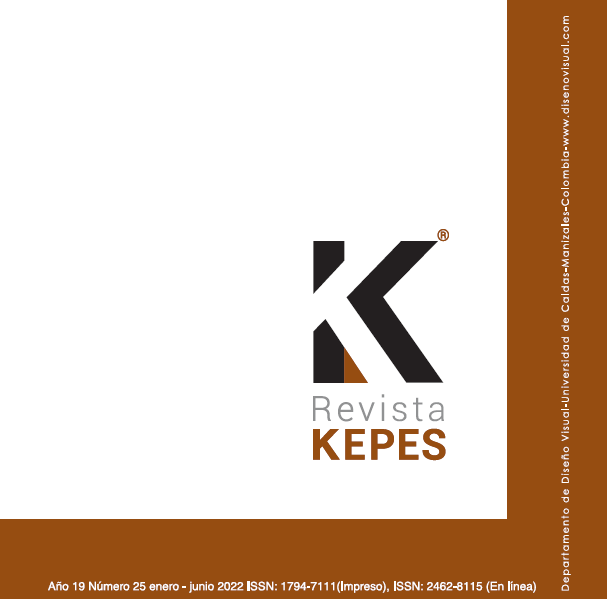Authors
Abstract
The results of the community co-creation project, “Youth Experiences for Peace”, whose main objective was to propose pedagogical alternatives to the Chair of Peace through narratives that start from the perspective of visual literacy, with the participation of 25 young victims of the armed conflict members of the Empirical Arts Foundation located in Villa del Rosario, Norte de Santander, are presented. The methodology consisted of participatory workshops from the action-research position to mobilize critical reflections and appropriation of production and training techniques inserted in the audiovisual culture, resulting in three plot short films that showed the experiences, memories 16 and challenges of the young people to make visible stories of their neighborhood life and to allow them to express rationalities to build a culture of peace in the territory through the application of the valuable components of an audiovisual project. This allows concluding that, in the first place Peace is a systemic category that cannot be reduced to the simple totality of a communicable knowledge but to a pedagogical experience that must affect both the subjects of teaching and learning. Secondly, the audiovisual presented new possibilities to the relationship that the participants had with the world, finding in this form of expression the way to meet and narrate authentically in the understanding of ceasing to be spectators and becoming authors and, finally, the challenge of generating projects that affect the representation of young victims in the Colombian audiovisual discourse.
Keywords:
References
Cerón, A. (2020). La construcción del objeto de estudio. Lecciones epistemológicas a partir de la obra de Pierre Bourdieu. Cinta moebio, 67, 75-84.
Cadús, R. (2020). Filosofía del cine. El pensamiento por otros medios. Revista Eidos, 33, 53-64.
Deleuze, G. (2014). Cine II. Los signos del movimiento y el tiempo. Editorial Cactus.
Elliot, J. (2005). El cambio educativo desde la investigación-acción. Morata.
Fresquet, A. (2014). Cine y educación: La potencia del gesto creativo. Editorial ocho libros.
GMH. (2013). ¡Basta Ya! Colombia: memorias de guerra y dignidad. Imprenta Nacional. http://www.centrodememoriahistorica.gov.co/descargas/informes2013/bastaYa/basta-yacolombia-memorias-de-guerra-y-dignidad-2016.pdf Heidegger, M. (2005). ¿Qué significa pensar? Editorial Trotta.
Hernández, J., Ramírez, M., Álvarez, C. y Garavito, J. (2019). Entornos de desterritorialización y contra hegemonía: una mirada existencial a la Pedagogía de los encuentros desde la imagen-cine. Utopía y Praxis Latinoamericana, 87, 53-64.
Herreras, E. y García-Granero, M. (2020). Sobre verdad, mentira y posverdad. Elementos para una filosofía de la información. Bajo Palabra, Revista de Filosofía, 24, 157-176.
Latorre, A. (2005). La investigación-Acción. Conocer y cambiar la práctica educativa. Editorial Grao.
López, R. (2017). Fotografía, alfabetización visual y educación en diseño. Revista Inventio, 13(31), 65-69.
Maldonado, J. (2008). Música y creación: un sentido en el pensamiento de Gilles Deleuze (tesis doctoral). Universidad Autónoma de Madrid.
Marcos, J. (2019). La Totalidad dominante desde Dussel como generadora de alienación identitaria. Encuentros: Revista de Ciencias Humanas, Teoría Social y Pensamiento Crítico, 9, 27-40.
Martín-Barbero, J. (2010). De los medios a las mediaciones. Comunicación, cultura y hegemonía. Anthropos.
Marrati, P. (2006). Gilles Deleuze. Cine y filosofía. Ediciones Nueva Visión.
Pallarès, M. (2020). Educación humanizada. Una aproximación a partir del legado de Heinrich Rombach. Estudios sobre educación, 38, 9-27.
Pallarès, M. y Villalobos, J. (2021). Educación de la memoria desde la literatura: pasado, (re) interpretación del presente y el recuerdo como praxis de formación. Revista Interdisciplinaria, 38(1), 69-84.
Parra, J. D. (2016). David Linch y el devenir cine de la filosofía. Instituto Tecnológico Metropolitano.
Rodríguez, P., De la Herrán, A. y Cortina, M. (2015). Pedagogía de la muerte mediante aprendizaje de servicio. Educación XX1, 18(1), 189-212.
Ruiz, A. y Gómez, S. (2021). Reimaginar una comunidad sobre las bases de la vulnerabilidad. Reflexiones desde Judith Butler. Tópicos, Revista de filosofía, 60, 201-228.
Tirado, V. (2019). Implicaciones para la estética del pensamiento de Xavier Zubiri. Revista Pensamiento, 75(286), 1127-1147.
Zourabichvili, F. (2004). Deleuze. Una filosofía del acontecimiento. Amorrortu editores.
Zuluaga, O. (1999). Pedagogía e historia. Editorial Siglo del Hombre.

 pdf (Español (España))
pdf (Español (España))
 FLIP
FLIP
 Perfil Google Scholar
Perfil Google Scholar


















